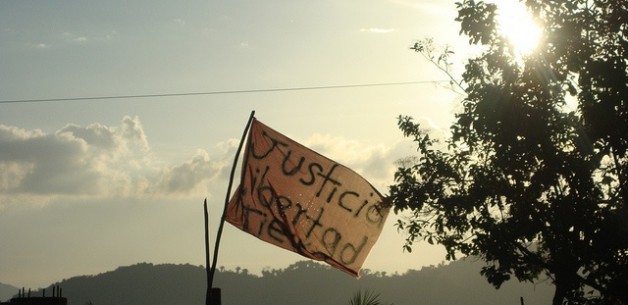This post is also available in: Spanish
Forty international and Honduran CSOs have signed a statement condemning the response of the International Finance Corporation (IFC) to the highly critical findings of the Compliance Adviser/Ombudsman (CAO) regarding the IFC’s investment in Corporación Dinant in Honduras, which has been associated with extensive human rights abuses, including the killing, kidnapping and forced eviction of farmers.
The investigation is one of the most damning ever issued by the internal watchdog and concludes that the Bank’s private sector lending arm, the International Finance Corporation:
- Failed to adhere to its own policies meant to protect local communities, and continued to allow the company to breach those safeguards over the past five years to the present;
- Either failed to spot or deliberately ignored the serious social, political and human rights context in which this company is operating or where it did, failed to act effectively on the information;
- Failed to disclose vital project information, consult with local communities, or to identify the project as a high-risk investment, despite public information that was widely available at the time the investment was made.
The CAO found that these failures arose, in part, from staff incentives “to overlook, fail to articulate, or even conceal potential environmental, social and conflict risk”, and that staff felt pressured to “get money out the door” and discouraged from “making waves”.
The CAO investigation reveals one of the most egregious investments in the IFC’s history. Such findings should rightly provoke shockwaves at the institution, and an admission of fault, a commitment to root and branch investigation and reform, and an apology and remedy to affected communities who have suffered at the hands of IFC’s client.
However, despite the CAO’s evidence of serious and sustained failures in IFC’s handling of the case, the IFC’s official response is superficial and its proposed actions totally inadequate. In the face of CAO-compiled evidence which points to systemic problems and could indicate malpractice on its part, the IFC not only refuses to address these systemic issues, but compounds them with further attempts to cover up its wrongdoings. In its response, the IFC rejects some of the CAO’s findings, without specifying which ones or providing evidence to support this rejection. IFC also states that the Action Plan is contingent on Dinant’s agreement. Of grave concern is that the IFC continues to deny that human rights abuses may have been committed by its client in the Aguán Valley, and to deny that the root cause of these abuses is a long standing conflict over land.
CSOs are now calling for:
- An admission by IFC CEO Jin Yong Cai of the many failures documented in the CAO investigation;
- The immediate withdrawal of the Action Plan and IFC response. In its place, set up a consultation mechanism that involves the farmers´ organizations in the development and implementation of a much stronger and more comprehensive action plan to correct the deficiencies highlighted by the CAO;
- The suspension of any further disbursements to Corporación Dinant, including the pending second $15 million tranche, and abstain from resuming funding until a) the material and intellectual authors of the crimes and human rights violations committed against organised farmers and their supporters in the Aguán Valley have been brought to justice. If Dinant is found to be responsible for any of these crimes and human rights violations, then the IFC should terminate its relationship with Dinant immediately; and b) a comprehensive, just, peaceful and sustainable resolution is provided to the conflicts over land between the Corporación Dinant, the state of Honduras and the local farmers´ movements;
- President Kim to commission an independent investigation of the underlying systemic reasons identified by the CAO for the repeated and serious failures to adhere to standards by IFC staff. This investigation should also propose measures to address and rectify these systemic failures, which are not limited to this case alone. It should also propose measures that incentivize IFC staff to work towards the two corporate goals of ending extreme poverty and promoting shared prosperity and not just getting money out of the door. In particular it should address what the CAO calls the ‘risk averse’ culture at the IFC, where “accountability for results defined primarily in financial terms may incentivize staff to overlook, fail to articulate, or even conceal potential environmental, social and conflict related risks.”
- A commitment to carry out human rights impact assessments in high risk countries and those with a documented culture of impunity, and a commitment to consider in these assessments the findings of UN human rights monitoring bodies as well as regional human rights systems.
A full list of NGO demands as well as highlighted IFC responses to the investigation can be seen in the full statement.
Resources:
CAO InvestigationIFC Response
CSO Statement



